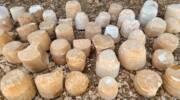
Flora Cohen presently lives in Nahariyya, Israel. She has three children and 16 grandchildren. However, she was born and raised in Casablanca, Morocco. Flora was born and spent her childhood living under French colonial rule. Under French rule, Flora claims that Morocco was a modern European state, full of cafés. However, in other respects, the Moroccans did not enjoy the same opportunities that the Europeans did. Furthermore, living as part of the Jewish minority there was not easy, since being a Jew was a dirty word both in French and Arabic.
While the situation on the whole was tolerable while the French were still in control of Morocco, Flora does not believe the situation was good in retrospect. Flora asserted that not every one was permitted to attend school. Attending school required having the right connections. In her family, all of the boys managed to go to school, yet out of all of the girls in her family, only she was able to go to school. One of her sisters tried to go to school, yet was continuously rejected and thus was forced instead to go to a vocational school where she learned how to sew, instead of learning how to read and write.
Kindergartens only existed for the very rich and women thus had to stay at home to raise the children, despite the fact that it was very difficult to finance having nine to ten children without the woman working. Furthermore, 80 percent of the students in Morocco were forced to quit their studying following the 8th grade because their families needed them to work for financial reasons. Flora blames the French for this, since they were the ones in control of the country, not the Arabs.
Flora claimed that while the French were still in control, Jews were able to coexist for the most part with Arabs peacefully. She knew Arabs in her area who were very good people and got along with the Jews well. However, there still were incidents. Flora’s grandfather and his brother were murdered by Arabs, thus leaving her grandmother a widow with two children at age 14. The family wasn’t even able to retrieve the bodies for a proper Jewish burial. In June 1948, bloody riots erupted in Oujda and Djerada, resulting in the death of 44 Moroccan Jews while many more were wounded. An unofficial boycott was initiated against the Moroccan Jewish community that same year. 18,000 Moroccan Jews went to Israel around this period of time, yet since the situation wasn’t as bad as in other Arab countries thanks to the French, most of the Jews staid in Morocco a bit longer than in other Arab states.
Nevertheless, it was a common practice in Morocco for some Muslims to abduct young virgin Jewish girls, forcefully convert them to Islam, and to make them marry Muslims. Indeed, one relative suffered this fate and thus did not come to Israel from Morocco with the rest of the family. In addition, Flora mentioned that one woman from Fez also was going to be forced to marry a Muslim and she decided to commit suicide rather than endure this fate. A lot of Moroccan Jews who do Jewish heritage trips to Morocco visit her grave to date. For this reason, Jewish girls were married off at a very early age, in order to avoid that horrible fate. This inhibited the development of Moroccan Jewish women.
However, once Moroccans rose up against the French in their struggle for independence, the situation dramatically deteriorated for Moroccan Jews. Terrorism was widespread within the country and Jews were also the victims of such violence, not just the French, since the Jews decided to support the French. Flora claimed that the situation in Morocco was very much similar to the situation in Israel during the Second Intifada period. There were explosions everywhere. Supermarkets were blowing up. People were scared to go out. Flora’s brother was almost murdered by Arabs as well during this period of time. However, one Arab saved his life by lying and claiming that he was an Arab Muslim from Fez. Soon after this incident, the family decided that they had to leave Morocco and make Aliyah to Israel, even though they weren’t allowed to bring more things with them than what could fit into just one suitcase. Around this period of time, most of the Jews in Morocco made Aliyah to Israel.
However, it took time for her family to leave the country. They spent two months stranded in a special camp in Casablanca, before they were permitted to leave. Yet, in August 1956, Flora and her family flew to France. In France, they were forced to stay there for another month, before they were permitted to move to Israel. When they arrived in Israel, they were placed on trucks and taken to Moshav Barak. In the moshav, there were no paved roads and no indoor bathrooms. Since they were assigned to create the moshav, they had to do much physical labor. It took a couple of years for her family to get established, yet in the end, her life significantly improved upon making Aliyah to Israel. In the moshav, her family had a house and was treated with dignity. The Ashkenazim and Mizrahim got along well together. She was very happy to come to Israel. In the end, she married an IDF soldier and raised her family near Haifa, before moving into a bigger house in Nahariyya. She was very happy with her decision to come to Israel.
By Rachel Avraham
Visit: http://www.jewishpress.com/blogs/guest-blog/one-womans-journey-from-morocco-to-israel/2013/04/21/
Do You Love Israel? Make a Donation - Show Your Support!
Donate to vital charities that help protect Israeli citizens and inspire millions around the world to support Israel too!
Now more than ever, Israel needs your help to fight and win the war -- including on the battlefield of public opinion.
Antisemitism, anti-Israel bias and boycotts are out of control. Israel's enemies are inciting terror and violence against innocent Israelis and Jews around the world. Help us fight back!






















